Exporting Power: Türkiye’s Defence Industry and the Politics of Strategic Autonomy
 By Fuad SHAHBAZOV, Baku-based independent regional security and defence analyst By Fuad SHAHBAZOV, Baku-based independent regional security and defence analyst
Over the last decade, the development of Turkey’s defence industry has become a crucial aspect of its soft power diplomacy in both regional and global politics. The country has made significant efforts to invest heavily in the development of its indigenous defence industry, reducing its dependence on imports and becoming a leading defence exporter in global markets. The rapidly changing regional and global geopolitical landscape, particularly after the Arab uprisings, has prompted Ankara to expand the country’s defence industry and reduce its reliance on overseas arms procurement and international supply chains. Since the ruling AKP government came to power, the country’s indigenous defence industry has undergone a significant transformation, steadily becoming the twelfth-largest arms exporter, according to the Stockholm International Peace Research Institute (SIPRI). Given the regional instability marked by violent uprisings and sectarian conflicts, Türkiye’s pursuit of defence industry development can be understood as a primarily threat-driven strategy. This approach reflects an effort to enhance national defence capabilities and ensure strategic autonomy in response to both external security challenges and internal vulnerabilities. READ MORE
- December 22, 2025 08:29AM
How China Shapes the Drone Divide in the Russia-Ukraine War
 By Fuad SHAHBAZOV, Baku-based independent regional security and defence analyst By Fuad SHAHBAZOV, Baku-based independent regional security and defence analyst
The war in Ukraine has evolved into a complex geopolitical conflict while demonstrating the transformative role that drone technology has played in shaping the course of the war. Following the Russian invasion of Ukraine in 2022, the Ukrainian Armed Forces began to actively embrace modern warfare technology, especially the use of First-Person Drones (FPVs) which were critical in inflicting grave damage on Russian forces using ‘meat grinder’ tactics to storm Ukrainian front-line positions. In the past two years, Ukrainian forces have used FPV drones for real-time intelligence and reconnaissance of Russian positions and troop movements while also deploying cost-effective “kamikaze” drones to target Russian recruits, tanks, howitzers, and other armoured vehicles. Although drone technology is now a core part of Ukraine’s struggle against Russian intervention, Kyiv initially faced an acute shortage of unmanned aerial vehicles (UAVs) in the early stages of the war, while the requirements of its frontline forces were partially met by civilian drones, mostly produced by the Chinese company DJI. READ MORE
- December 22, 2025 07:00AM
Taking up Maritime Security Challenges and Stakes : A European Governance Mechanism?
 By Jean-Marie L’HUISSIERE, independent consultant and expert on European maritime policies
By Jean-Marie L’HUISSIERE, independent consultant and expert on European maritime policies
While the European Union (EU) benefits today from a large regulatory acquis and from a vast experience in maritime operations and programmes, efforts must go on with regard to coordination and consistency to overcome sectoral divisions and increase efficiency. Taking up challenges and stakes in the maritime domain requires to implement concretely the integration principles and the comprehensive approach, by coordinating the use of both civilian and military resources and capabilities available to the EU. […] An initiative aiming at establishing an inter-institutional mechanism for maritime governance at strategic level opens prospects in this direction. READ MORE
- December 12, 2025 04:41AM
The Acceleration of Putin’s Shadow War
 By Fuad SHAHBAZOV, Baku-based independent regional security and defence analyst By Fuad SHAHBAZOV, Baku-based independent regional security and defence analyst
Air incursions, military drills, and escalating hybrid warfare hint at a new and alarming level of Russian aggression. Is it just for show?
Russia and Belarus held joint military drills in September. But the biennial exercises were overshadowed by something that may be more ominous — an outbreak of drone and aerial incursions across Poland and the Nordic-Baltic states that illustrate NATO members’ vulnerability to disabling attacks on fragile systems like civil airports. Zapad-2025 is an established Kremlin method of baring its military teeth to its near-neighbours. The official reason for September’s large-scale exercises is to test the ability of the two countries to repel an enemy attack, retake lost territory and secure the borders of what they refer to as their “Union State”. They have often triggered alarm across the NATO alliance, particularly in the Baltic states and Poland, which have a deep historical and recent sensitivity to Kremlin aggression. READ MORE
The intersection between Turkey’s defence industry and its foreign policy  By Yeghia TASHJIAN, Beirut-based regional analyst and researcher, columnist, "The Armenian Weekly” By Yeghia TASHJIAN, Beirut-based regional analyst and researcher, columnist, "The Armenian Weekly”
After the end of the Cold War, Turkish decision-makers adopted a “top-down” strategy that capitalized on the dramatic shift in international arms production. Turkey aimed to look eastward to cooperate with China and Russia as its threat perception changed. In the second half of the 1990s, Turkey became a prominent Israeli arms purchaser. There were numerous factors behind this. First, Israeli weapons were a high-tech and credible alternative to NATO weapons. Second, unlike Europe and the U.S., Israeli arms purchases were not conditioned to Turkey’s domestic developments (democratization, human rights, minority rights…). Third, Israel and Turkey’s foreign policies overlapped in critical areas in the Middle East, aiming to contain Syrian and Iranian interests. Finally, deep relations with Israel were expected to be rewarded by pro-Israeli lobbying groups in the U.S. to counter the Armenian and Greek lobbies.
READ MORE
The likeliest scenarios for tomorrow’s Russia  By Marat Terterov, PhD, Founder, and former Executive Director of the EGF By Marat Terterov, PhD, Founder, and former Executive Director of the EGF
The folly of predicting Russia’s future
When undertaking the task of seeking to forecast a ‘likely scenario’ for tomorrow’s Russia, one has to start with a caveat – predicting Russia’s future and what fate awaits the country in light of its continued military excursion in Ukraine is like trying to find a needle in a haystack. In other words, it is almost impossible to predict future political developments in Russia with any real certainty. This includes any efforts to predict whether Russia will continue to remain the arch belligerent in Ukraine, or whether it will be prepared to make concessions, or to forecast what impact either (or other) of these developments in the current conflict in Ukraine will have on the Russian regime of Vladimir Putin.
READ MORE
Will an Armenia-Azerbaijan peace agreement be indefinitely delayed?  By Vasif HUSEYNOV, PhD, Head of Department, AIR Center, Adjunct Lecturer, ADA and Khazar Universities, Baku By Vasif HUSEYNOV, PhD, Head of Department, AIR Center, Adjunct Lecturer, ADA and Khazar Universities, Baku
2023 ended with positive notes for the Armenia-Azerbaijan peace process, but the new year has so far failed to maintain the momentum. Despite a successful prisoner exchange, and Armenia’s endorsement of Azerbaijan’s COP29 candidacy, recent statements from the respective governments have presented a mixed picture. While the Azerbaijani side has not indicated any setbacks in the ongoing talks yet, the Armenian government has criticized the recent statements by the Azerbaijani leader as unconstructive for the peace process.
Complicating matters further, disagreements have intensified regarding the possible regulations along the Zangezur corridor. The latest developments highlight a disparity in the visions of Russia, Armenia, and Azerbaijan for this corridor. Unfortunately, these developments suggest that the obstacles in the Armenia-Azerbaijan peace treaty talks may be more fundamental, potentially leading to indefinite delays in the process.
READ MORE
- February 24, 2024 10:13AM
Armenia and Azerbaijan Address Concerns Over Territorial Integrity  By Vasif HUSEYNOV, PhD, Head of Department, AIR Center, Adjunct Lecturer, ADA and Khazar Universities, Baku By Vasif HUSEYNOV, PhD, Head of Department, AIR Center, Adjunct Lecturer, ADA and Khazar Universities, Baku
On January 19, Armenian Prime Minister Nikol Pashinyan called for a new constitution in a meeting with senior officials from the Armenian Ministry of Justice. Pashinyan asserted that Armenia needs “a new constitution, not constitutional changes,” adding that the new foundational document would make the country “more competitive and viable in the new geopolitical and regional environment” (Azatutyun.am, January 19). He highlighted that the new constitution would maintain the present parliamentary system and underscored “external security” and “internationally recognized sovereign territory” as the main issues to be addressed. Mutual respect for one another’s territorial integrity remains a sticking point in peace negotiations between Armenia and Azerbaijan. If Yerevan proceeds with Pashinyan’s proposal, the new constitution will eliminate certain hurdles to signing a peace treaty with Baku.
READ MORE
What Next in Armenia – Azerbaijan Negotiations  By Benyamin POGHOSYAN, PhD, Chairman, Center for Political and Economic Strategic Studies By Benyamin POGHOSYAN, PhD, Chairman, Center for Political and Economic Strategic Studies
In the late months of 2022 and 2023 there were intensive discussions about the possible signature of the Armenia – Azerbaijan peace agreement. Both international mediators and facilitators, as well as representatives of Armenia and Azerbaijan were making statements that a peace agreement signature is within reach. As we enter 2024, discussions are underway about the potential signature of the Armenia – Azerbaijan agreement in 2024. The December 7, 2023, bilateral statement on the release of Prisoners of War and Armenia’s support of the Azerbaijani bid to host the COP29 in Baku gave more impetus to these hopes. Some believe that the military takeover of Nagorno Karabakh by Azerbaijan in September 2023 made this perspective more realistic, especially as the Armenian government agreed not to include anything on Nagorno Karabakh in the peace agreement.
READ MORE
The Geopolitical Background of the Moscow-Yerevan Rift and Russia’s Future in the Region  By Yeghia TASHJIAN, Beirut-based regional analyst and researcher, columnist, "The Armenian Weekly” By Yeghia TASHJIAN, Beirut-based regional analyst and researcher, columnist, "The Armenian Weekly”
Recent geopolitical developments in the South Caucasus have once again appeared in the headlines of media and analytical centers. Experts have been questioning whether Russia is distancing itself from the region. Armenian regional experts and officials have been questioning Russia’s motives in the region, considering developments in Artsakh and the latest Azerbaijani escalation. Russia is navigating the narrow complexities of the post-2020 Artsakh War regional architecture, asserting itself as the main power broker in the region (i.e. brokering the 2020 trilateral ceasefire agreement, arranging humanitarian aid to Artsakh via the Berdzor Corridor and Aghdam, and possibly a new deal in the coming days) through compromise or political flexibility. This flexibility has caused friction in Moscow-Yerevan relations.
Many in Russia, including high officials, are suspicious of Armenian Prime Minister Nikol Pashinyan’s motives towards their country. The Armenian leader has speculated that Russia seems to be leaving the region. However, Russia still views the region as “blizhnee zarubezhe” (its “near abroad”) or its “lebensraum” (its “vital space”). From Russia’s perspective, if it leaves the South Caucasus, its only route to the Middle East would be cut off, Iran and Turkey would clash for power, and the North Caucasus would become vulnerable to instability.
READ MORE
Azerbaijan Moves to Disarm Karabakh Separatists (Part Two)  By Vasif HUSEYNOV, PhD, Head of Department, AIR Center, Adjunct Lecturer, ADA and Khazar Universities, Baku By Vasif HUSEYNOV, PhD, Head of Department, AIR Center, Adjunct Lecturer, ADA and Khazar Universities, Baku
On September 20, Azerbaijan called for a ceasefire in the operation against armed detachments of the separatist regime in Karabakh. In a televised address to the nation, President Ilham Aliyev stated that Baku’s conditions were accepted by the separatist entity. He announced that the “representatives of the Armenian community living in Karabakh, who refused to meet our representatives several months ago, are ready to meet in the city of Yevlakh. Azerbaijan has disclosed that 192 servicemen were killed and more than 500 wounded during the 24-hour “anti-terrorist operation”. The Armenian side has reported at least 200 people killed and more than 400 wounded.
In preventing further escalation, the Armenian government chose not to militarily intervene in the clashes on September 19 and 20. Armenian Prime Minister Nikol Pashinyan characterized possible involvement as a threat to his country. He stated, “Armenia is not involved in military operations. I want to mention once again that Armenia does not have an army in Nagorno-Karabakh”.
READ MORE
Pushing Armenia to make further concessions will spoil any chance for peace  By Benyamin POGHOSYAN, PhD, Chairman, Center for Political and Economic Strategic Studies By Benyamin POGHOSYAN, PhD, Chairman, Center for Political and Economic Strategic Studies
After a break of several months Armenia and Azerbaijan have now resumed their engagement in peace negotiations in earnest. After a face-to-face meeting between leaders in Munich in February, the Armenian and Azerbaijani ministers of foreign affairs went to Washington in early May 2023 to take part in the most intensive round of negotiations ever held since the Spring 2001 Key West summit between Presidents Heydar Aliyev and Robert Kocharyan. The ministers achieved progress, opening the path for the 14 May Brussels summit involving Prime Minister Pashinyan, President Aliyev, and President of the European Union Council Charles Michel. On 19 May, the Armenian and Azerbaijani foreign ministers met in Moscow, and a trilateral Aliyev - Pashinyan - Putin summit was scheduled for 25 May.
READ MORE
Diversification of Armenian Security and Defence Policy and the Role of India  By Benyamin POGHOSYAN, PhD, Chairman, Center for Political and Economic Strategic Studies By Benyamin POGHOSYAN, PhD, Chairman, Center for Political and Economic Strategic Studies
The 2020 Nagorno Karabakh war has significantly changed the balance of power in the South Caucasus, increasing the role and influence of Turkey. The direct involvement of Turkey in the war and the lack of action by Russia to prevent this NATO member state from challenging the Russian zone of influence in the post-Soviet space crushed the basics of the Armenian foreign and security policy. Since the end of the first Nagorno Karabakh war in 1994, Armenian military doctrine has been based on the core belief that Russia will not allow direct Turkish involvement in a new war against Armenia. Thus, Armenia prepared itself for the war with Azerbaijan while outsourcing to Russia the deterrence of Turkey. Meanwhile, this mindset also resulted in a Russia-focused defence and security policy. Armenia was buying weapons mainly from Russia, almost all Armenian officers were studying in Russian military universities, and the structure and operating mode of the Armenian army was solely based on the Russian model. Armenia developed limited defence cooperation with other nations, including the US, Greece, and Poland, and signed its first Individual Partnership Action Plan with NATO in 2005. However, these sporadic interactions did not change the basics of Russia-focused foreign and military policy. READ MORE
Turkey Holds the Nordic Countries at Gunpoint: Implications for NATO 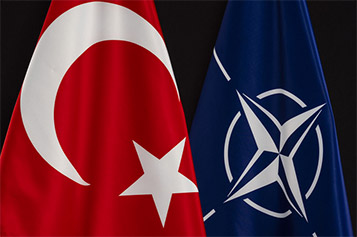 By Eugene KOGAN, Tbilisi-based defence and security expert By Eugene KOGAN, Tbilisi-based defence and security expert
It is a paradox that two democratic Nordic countries that are willing to join NATO and become interoperable with it are kept at bay by pseudo-democratic NATO member Turkey. As long as this situation persists, Russia strategically has the last laugh. This could have been avoided if the proposed policy recommendations had been implemented by NATO some time ago.
To begin with, it is crucial to recall a preamble to the North Atlantic Treaty (Washington Treaty 1949), namely: ‘The Parties to this Treaty are determined to safeguard the freedom – founded on the principles of democracy, individual liberty and the rule of law’. Obviously, these principles have been repeatedly trampled upon by Turkey’s President Recep Tayyip Erdogan over the last decade. And now, two democratic candidates for NATO membership, Finland and Sweden, have to fulfil conditions virtually imposed by the pseudo-democratic government of Turkey. This is a worrying paradox. READ MORE
After the De-occupation of Kherson: Winter Break or Attack on Crimea?  By Nika CHITADZE, PhD, Director of the Center for International Studies, Tbilisi By Nika CHITADZE, PhD, Director of the Center for International Studies, Tbilisi
As it is known, the liberation of Kherson has already been assessed as a great military and an important political and psychological victory for Ukraine. Now it is possible to analyze what new opportunities this gives to the Ukrainian army and how things will develop. At the same time, the Russian forces launched a massive offensive in the Donetsk region, and are carrying out more intensive missile attacks against the critical infrastructure of Ukraine, as a result of which, first of all, the civilian population of the country is harmed and the victims are increasing more and more. With all of the above, the Russians want to somehow cover up the Kherson disaster. At the same time, it is worth noting the fact that the Russian army is insufficiently equipped and not ready for the winter war. This is the main reason why the Russians are asking for negotiations. According to them, depending on the situation on the front, the events may develop in two scenarios - the parties take the so-called winter break, or the armed forces of Ukraine develop an offensive to the south - first in the direction of Melitopol and Mariupol, and then in the direction of Crimea.
READ MORE
- February 16, 2023 11:38AM
Post-Soviet Peace: We Demand Peace 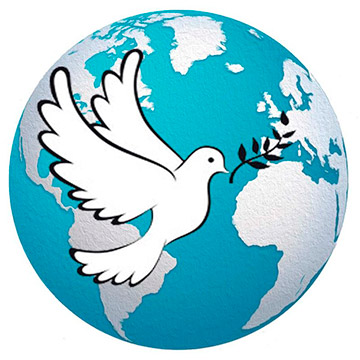 An open letter signed by people from Armenia, Azerbaijan, Russia, Turkey, and other countries An open letter signed by people from Armenia, Azerbaijan, Russia, Turkey, and other countries
We, a group of people who stand for peace, from the post-Soviet space and its neighbourhood exhausted by never-ending wars and growing imperialist rivalry on our territories, are full of rage as we have observed Azerbaijan’s recent large-scale attack on Armenia. This, coupled with Russian Federation’s attack on Ukraine and the renewed military clashes in border areas between Kyrgyzstan and Tajikistan, raises heavy concerns regarding possible future escalations not only in the Armenia-Azerbaijan conflict but all other conflicts in the post-Soviet space.
The recent attack on Armenia has costed hundreds of lives within two days from both sides of the conflict, caused serious destruction to civil infrastructure in Armenia, displaced thousands, and further widened the gap between the countries and their people. We raise our persistent voices against the continuing warfare. READ MORE
No Peace Should not Mean War  By Benyamin POGHOSYAN, PhD, Chairman, Center for Political and Economic Strategic Studies By Benyamin POGHOSYAN, PhD, Chairman, Center for Political and Economic Strategic Studies
The developments of the last three weeks have proved that Armenia and Azerbaijan are far from signing a peace agreement, at least by the end of 2022. There is a danger that Azerbaijan may interpret this as a failure of the peace process and use this as a "moral justification" to launch a new large-scale aggression. If this happens, it will push Armenia and Azerbaijan further back from any chance to reach an agreement and deepen the mutual mistrust.
In recent months Armenia – Azerbaijan negotiation process passed through several ups and downs. The September 13-14, 2022, Azerbaijani aggression seemed to jeopardize the fragile achievements reached during the three Brussel summits held in April, May, and August 2022. However, immediately after the ceasefire reached on September 14, there was a new push toward reaching a peace agreement. Armenian and Azerbaijani foreign ministers met in New York in late September and Geneva on October 2; Secretary of the Armenian Security Council Armen Grigoryan had a meeting with President Aliyev’s top foreign policy aide Hikmet Hajiyev in Washington on September 27, 2022. READ MORE
- December 13, 2022 05:37AM
Balancing the mediators - Armenia and Azerbaijan should avoid offending Russia  By Benyamin POGHOSYAN, PhD, Chairman, Center for Political and Economic Strategic Studies By Benyamin POGHOSYAN, PhD, Chairman, Center for Political and Economic Strategic Studies
The trilateral statement of November 10, 2020, which ended the 2020 Karabakh war seemed to sideline the US and France, who with Russia had for decades co-chaired the OSCE Minsk Group, from involvement in any post-war conflict settlement arrangements. It established instead a Russian monopoly in mediating future arrangements in the region. Neither Washington nor France was involved in preparing the November 10 statement, while the deployment of Russian peacekeepers in Nagorno Karabakh fomented the role of Russia as the only security provider for Nagorno Karabakh Armenians. Armenia, Azerbaijan, and Russia signed another trilateral statement on January 11, 2021, focused on restoring communications. The leaders' November 26, 2021, summit aimed to promote a border delimitation and demarcation process. In late 2021, the West started taking small steps to re-insert itself in the negotiation process, with the President of the European Council organizing the first Aliyev – Pashinyan summit in Brussels. READ MORE
The CSTO and Azerbaijan’s recent aggression against Armenia  By Benyamin POGHOSYAN, PhD, Chairman, Center for Political and Economic Strategic Studies By Benyamin POGHOSYAN, PhD, Chairman, Center for Political and Economic Strategic Studies
Azerbaijan launched a new, large-scale aggression against Armenia on September 13, and the absence of tangible actions by the CSTO to stop Azerbaijan’s attacks have reinvigorated discussions in Armenia about the country’s potential withdrawal from the CSTO. This recent wave of public discontent in Armenia about the CSTO coincided with a visit to Armenia by U.S. House Speaker Nancy Pelosi, which added a geopolitical component to the discussions, given the complete rupture of relations between the United States and Russia. On the very day of Azerbaijan’s aggression, Armenia officially appealed to the CSTO, based on article 4 of the treaty, asking for support, including by military means. READ MORE
Peacekeeping in Karabakh Can Learn from the UNOMIG Experience  By Benyamin POGHOSYAN, PhD, Chairman, Center for Political and Economic Strategic Studies By Benyamin POGHOSYAN, PhD, Chairman, Center for Political and Economic Strategic Studies
As Armenia and Azerbaijan come closer to launching bilateral negotiations over the normalisation of relations, many issues wait for a solution. Currently, the hottest debates are underway regarding the future status of Nagorno Karabakh and the legal modalities of the transit for Armenian and Azerbaijani goods passing each other territories. The war in Ukraine and the complete collapse of Russia – West relations added geopolitical components to the equilibrium. Do we have EU – Russia competition over the mediation process? Are there any disagreements between Brussels and Moscow on promoting lasting peace and stability in the South Caucasus? All these issues are worthy of being discussed and debated. READ MORE
Black Sea Security in Times of War 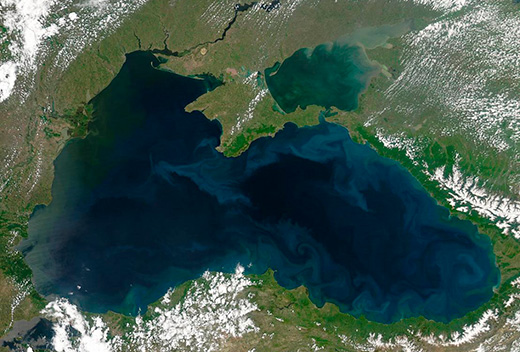 By Eugene KOGAN, Tbilisi-based defence and security expert By Eugene KOGAN, Tbilisi-based defence and security expert
There is no doubt that the ongoing Russian military action against Ukraine profoundly affects the rest of the Black Sea littoral states: Bulgaria, Georgia, Romania and Turkey. The tense standoff of recent weeks placed each of them in a difficult position between apprehension and, particularly with Turkey, a kind of peacemaker or rather mediator, which Russia now ignores completely.
Romanian Defence Minister, Vasile Dincu, said in January 2022 that “Russia, at the moment, is not a direct threat to Romania, but it is [rather] a threat to security in the [Black Sea] area”. The author disagrees with the minister’s statement since the Russian military, which is stationed on the occupied Crimean peninsula - not much more than 100 km from the Danube Delta – is a direct threat to Romania, even though Russian officials will blame the other side for posing a threat to Russia. Furthermore, the region’s three NATO member countries, namely Bulgaria, Romania and Turkey, have until today been unable to create and implement a comprehensive Black Sea security strategy together with NATO aspirants Georgia and Ukraine to counter the challenges posed by Russia. The latter, however, successfully implemented its divide and rule policy in the region. READ MORE.
A Path to a Peace Agreement between Armenia and Azerbaijan  By Benyamin POGHOSYAN, PhD, Chairman, Center for Political and Economic Strategic Studies By Benyamin POGHOSYAN, PhD, Chairman, Center for Political and Economic Strategic Studies
While the world continues to follow the war in Ukraine and the growing tensions in relations between Russia and the West, Armenia and Azerbaijan are ready to launch negotiations to sign a peace treaty. All external powers involved in the region’s geopolitics – Russia, the US, the EU, Turkey, and Iran – support this process. Armenia and Azerbaijan will soon launch three separate, though interconnected, processes: the start of the work of the bilateral border delimitation and demarcation commission, the restoration of communications infrastructure, and the launch of negotiations on a peace treaty. These issues are discussed on two parallel platforms – Armenia-Azerbaijan-EU and Armenia-Azerbaijan-Russia. Both Russia and the EU support the start of work on all three tracks. READ MORE
Russia-China-Afghanistan 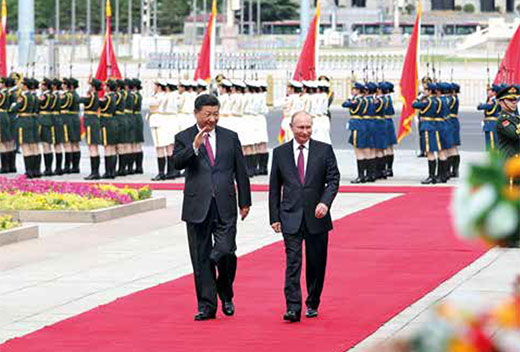 By Eugene KOGAN, Tbilisi-based defence and security expert By Eugene KOGAN, Tbilisi-based defence and security expert
Moscow and Beijing are likely to discover that their initial joy over the US withdrawal from Afghanistan may be premature. Afghanistan under the Taliban remains divided, insecure and uncertain about its current and future path. Without stability and security, neither Beijing nor Moscow will provide economic assistance while the international community will continue to shun Afghanistan.
Russia’s Presidential Envoy to Afghanistan, Zamir Kabulov, noted that “The Taliban were easier to negotiate with than the old “puppet government” of the exiled President Ashraf Ghani.” The latter was seen by, and from Moscow, as a puppet of the West and contacts that Russia maintained with Hamid Karzai’s successor were either downgraded or revised. At the same time, contacts between Russia and the Taliban only increased. With the West’s departure, Moscow is seizing up the opportunity indirectly to recognise the authority of the Taliban, which it officially designated as a terrorist organisation back in 2003 though without burning its bridges with the militant group. READ MORE.
Risks and Opportunities of the Emerging South Caucasus Regional Order   Policy Recommendations from the 21st workshop of RSSC SG/PfP Consortium Policy Recommendations from the 21st workshop of RSSC SG/PfP Consortium
The Regional Stability in the South Caucasus Study Group (RSSC SG) was proud to resume its activities in a face-to face format in Rome, 7-10 September 2021. On that occasion, the Study Group discussed and subsequently agreed on a number of policy recommendations.
The second Karabakh war was the catalyst for massive changes in the South Caucasus. Certainly, the new territorial realities fit better the internationally recognized territories of both countries, but important challenges remain, making it important for the RSSC SG to meet to spur thinking on the way forward. The conflict was also an opportunity for other regional actors. Georgia deployed uncommon diplomacy and peace-making skills in the aftermath of the combat phase between Armenia and Azerbaijan. While Georgia demonstrated its ability at being an effective bridge between the two belligerents, Russia established itself as the essential arbiter and guarantor of a fragile ceasefire, and of purveyor of security for new lines of demarcation between Armenia and Azerbaijan. Turkey has not waited and sided with Azerbaijan in achieving and securing the new territorial realities. READ MORE
Why non-aligned Azerbaijan signed an alliance declaration with Russia
 By Fuad SHAHBAZOV, Baku-based independent regional security and defence analyst By Fuad SHAHBAZOV, Baku-based independent regional security and defence analyst
On February 22, the President of Azerbaijan Ilham Aliyev made an paid official trip visit to Moscow to discuss and sign a new declaration on allied cooperation with Russia. The visit came just a day after President Putin's infamous decision to recognize the independence of the so-called Donetsk People's Republic and Luhansk Peoples' Republic in Eastern Ukraine. President Vladimir Putin’s “unexpected” decision deteriorated relations with Ukraine, even more and was followed by the new round of economic sanctions imposed by the U.S and the EU.
President Aliyev's visit to Moscow triggered debates in Azerbaijan and Russia, respectively, on whether the main text of the declaration was pre-negotiated between the two leaders, or prepared amid the escalation around Ukraine. READ MORE
War and Peace in the South Caucasus: Putin Style  By Alan Whitehorn, Professor Emeritus in Political Science, The Royal Military College of Canada By Alan Whitehorn, Professor Emeritus in Political Science, The Royal Military College of Canada
Without a doubt, Russia’s leader Vladimir Putin is the greatest factor in the risk of war between Russia and Ukraine. Yet paradoxically, Putin is perhaps the best hope for peace in the South Caucasus, at least as far as Azerbaijan and Armenia are concerned. The Georgian situation is, however, another matter. But one should take one step at a time in this exceptionally dangerous and conflict-prone region.
The recent 2020 Karabakh War between Azerbaijan and Armenia was, in effect, a continuation of the bitter 1990s ethno-religious territorial war over Nagorno-Karabakh (Artsakh) that emerged between the two newly independent states in the midst of the break-up of the Soviet Union. The 1990s conflict produced thousands of casualties and hundreds of thousands of displaced civilian ethnic minority refugees. It was a humanitarian catastrophe for families on both sides of the border. READ MORE
- February 28, 2022 20:03PM
Assessing the Urban Terrorism Strategy of the Kurdistan Workers' Party in Turkey
 By Fuad SHAHBAZOV, Baku-based independent regional security and defence analyst By Fuad SHAHBAZOV, Baku-based independent regional security and defence analyst
Since its emergence in the 1980s, the Kurdistan Workers' Party (PKK) has been a significant source of concern to the state of Turkey. With the escalation of conflict between the Turkish state and the ethnic Kurdish community in the 1990s, the level of violence explicitly increased, and the civilian death toll rose to its highest point. Though the PKK could not ensure absolute authority in large, predominantly Kurdish provinces in the southeast, it gradually shifted to a new strategy —urban violence— to undermine the Turkish state's authority in Kurdish regions.
According to theories of violent resistance, violence is the only practical and productive tool of mass mobilisation of ethnic insurgencies against political systems. In the case of Kurdish nationalism in Turkey, many scholars argue that Turkey's policy of ethnic nationalism has had a decisive role in shaping Kurdish ethnic nationalism throughout these years. READ MORE
- February 28, 2022 19:44PM
What's behind the Fresh Tensions between Iran and Azerbaijan?
 By Fuad Shahbazov, Baku-based independent regional security and defence analyst By Fuad Shahbazov, Baku-based independent regional security and defence analyst
In the period immediately after the 44-day Karabakh war, Baku-Tehran relations remained on the level of pragmatic co-operation, until the new conservative political establishment ascended to power in Iran. Since then, Tehran’s rhetoric against Azerbaijan has shifted from that of “partnership” to open threats that explicitly neglect the partnership atmosphere. Relations between Baku and Tehran have always been unstable, particularly at the beginning of the 2000s. However, they rekindled when both countries became engaged in regional infrastructure and transit projects. READ MORE
- December 15, 2021 09:08AM
Delimitation, Demarcation and Cartographic Manipulation in the Wake of the 44 Days War 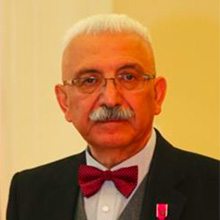 By Hayk KOTANJIAN, Lieutenant General (Ret.), D.Sc., Professor of Political Science of the RA, RF, USA (state studies-strategic security studies), Full Member of the Academy of Military Sciences of the RF By Hayk KOTANJIAN, Lieutenant General (Ret.), D.Sc., Professor of Political Science of the RA, RF, USA (state studies-strategic security studies), Full Member of the Academy of Military Sciences of the RF
In the wake of the 44-day war in 2020, an unprecedented escalation of the process of delimitation and demarcation of the Armenian-Azerbaijani borders has been launched. This was done contrary to the principles and procedure for border delimitation and demarcation recommended by the OSCE Secretariat. The unparalleled pressure on the Armenian population from Karabakh was accompanied by subsequent attempts to undermine the settlement process under the auspices of the OSCE Minsk Group co-chairmanship. Among the arguments substantiating claims to include Nagorno-Karabakh in Azerbaijan, Baku authorities refer to the Azerbaijani-language toponymy, which allegedly has a long history. READ MORE
Assessing Armenians’ Geopolitical Situation  By Alan Whitehorn, Professor Emeritus in Political Science, The Royal Military College of Canada By Alan Whitehorn, Professor Emeritus in Political Science, The Royal Military College of Canada
Armenia is at yet another critical time. The war losses were substantial and impacted greatly. Violent Azerbaijani-Armenian border incidents continue, with property damage, military personnel injuries and deaths. The risks ahead are significant. Accordingly, it is crucial to assess the geopolitical situation that confronts Armenia, commencing first with key problems and challenges and then exploring some opportunities.
Amongst the pressing issues is the fact that demographically Armenia has far less manpower than Azerbaijan, even if women were conscripted too. Armenia’s population has been declining significantly due to outmigration and this pattern has been accelerating after the recent Karabakh war and various phases of the Covid pandemic. An army historically based on conscription needs to address its critical declining population base. READ MORE
Polish-Romanian Defence and Security Policy 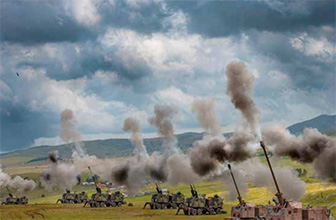 By Eugene Kogan, Tbilisi-based defence and security expert By Eugene Kogan, Tbilisi-based defence and security expert
A joint initiative of Romanian President Klaus Iohannis and Polish President Andrzej Duda, known as the ‘Bucharest Nine', was launched in November 2015 and laid a foundation for foreign and security policy meetings and discussions. As the next step, the Warsaw NATO Summit in July 2016 accelerated military-to-military cooperation. As a result, the initiative brought Romanian troops to Poland and Polish troops to Romania on a rotational basis in March 2017. In addition, their pivotal positions in the east and in the south of NATO’s reach have further increased their cooperation in a variety of defence and security programmes. READ MORE.
Potential Stress Points in the Nagorno-Karabakh Ceasefire Agreement  By Alan Whitehorn, Professor Emeritus in Political Science, The Royal Military College of Canada By Alan Whitehorn, Professor Emeritus in Political Science, The Royal Military College of Canada
There are number of potential stress points in the ceasefire agreement signed by Russia, Azerbaijan and Armenia, but also agreed to by the president of Nagorno Karabakh on November 9th, 2020. It is a document that was signed under the duress of rapidly deteriorating war conditions for Armenians. Few within Armenia were consulted apart from some senior military leaders. It has not been ratified by the Armenian Parliament. Public disapproval has been extensive READ MORE.
In 2021 Armenia Can Only Wait and Watch whilst Others Decide the Fate of Karabakh  By Benyamin Poghosyan, PhD, Chairman, Center for Political and Economic Strategic Studies By Benyamin Poghosyan, PhD, Chairman, Center for Political and Economic Strategic Studies
Since the end of the second Karabakh war in November 2020, Armenian, Azerbaijani, and international pundits have published many opinions and assessments focusing on the war, its causes and consequences, and the decisive victory of Azerbaijan. The strategic blunders of the Pashinyan government, the Russia – Turkey deal, and the aloofness of the US, are among the hotly debated issues about what contributed to the launch of the war, and the capitulation of Armenia. Some experts seek to forecast the distant future (5-10 years). They argue that Armenia will accept its defeat, will forget about territories taken by Azerbaijan during the war, and will seek to get material benefits through establishing economic cooperation with Baku and Ankara. READ MORE
- February 25, 2021 07:32AM
How to Break the Current Deadlock in Nagorno-Karabakh Conflict Resolution: Strategic Dialogue on the Peace Process within a Boosted Peace Context?
2020 Research Digest, edited by George Vlad NICULESCU, EGF Head of Research
The 2020 European Geopolitical Forum Research Digest aimed to explore the resilience of the Nagorno-Karabakh (NK) peace process driven by the implementation of the Madrid/Basic Principles, and the increased relevance of the peace context, created by various initiatives aiming to incentivize peaceful conflict resolution. It consists of three research papers drafted by distinguished Armenian, Azerbaijani, and Russian experts, who have been invited to respond generic questions such as: Are the Madrid Principles really dead? Why haven’t they been implemented so far? What are the Armenian perceived downsides of the Madrid Principles as the most plausible option for the Karabakh conflict resolution? Why does Azerbaijan support the Madrid Principles, and why does Baku believe they could still lead the way to a breakthrough in the peace process? What structural, institutional, conceptual, or operational changes could unblock the NK peace process, while taking advantage from a much needed boost of the peace context? READ MORE
Expert Peer-Review
 By Alan Whitehorn, Professor Emeritus in Political Science, The Royal Military College of Canada
By Alan Whitehorn, Professor Emeritus in Political Science, The Royal Military College of Canada
When there is so much shelling and yelling in the South Caucasus conflict over Nagorno-Karabakh, it is helpful to read a collection of thoughtful essays by knowledgeable authors from several differing countries and perspectives that appeared in The European Geopolitical Forum. Each piece is a welcome contribution, but nevertheless has key gaps and issues. I will comment on each in the order in which they appear. READ THE REVIEW
Nagorno-Karabakh Crisis: Azerbaijan’s Fraying Temper  By Khayal Iskandarov Ibrahim, Rashad Tahirov Kamal, PhD in philology, associate professor Sadi Sadiyev Saleh By Khayal Iskandarov Ibrahim, Rashad Tahirov Kamal, PhD in philology, associate professor Sadi Sadiyev Saleh
Another escalation in Nagorno-Karabakh in early morning on September 27, 2020 brought Armenian-Azerbaijani conflict once again to the focus of world community. Approximately 30 years have elapsed since this conflict was initiated. However, there has not been any substantial progress in the efforts to solve the problem. The prominent political figures in Armenia, who more or less understood the consequences of their actions and endeavored to solve the problem, were either ousted or assassinated. READ MORE.
The Recent Evolution of Azerbaijan–Turkey–Armenia–Russia Relations and Its Implications for the Settlement of the Karabakh Conflict  By Benyamin Poghosyan, PhD, Chairman, Center for Political and Economic Strategic Studies By Benyamin Poghosyan, PhD, Chairman, Center for Political and Economic Strategic Studies
The July 2020 escalation along Armenia – Azerbaijan international border and following events have again put Armenia – Russia – Azerbaijan – Turkey relations in the spotlight of media and expert community. In recent years there was a wide spread perception that Azerbaijan has been making efforts to improve its relations with Russia, while Armenia – Russia relations entered an unchartered waters after the 2018 “Velvet revolution”. The large scale purchases of Russian modern weaponry by Azerbaijan were the main driver of improving bilateral relations. READ MORE
A Tangled Tale  By Benyamin Poghosyan, PhD, Chairman, Center for Political and Economic Strategic Studies By Benyamin Poghosyan, PhD, Chairman, Center for Political and Economic Strategic Studies
Tensions in the Aegean between Turkey and Greece have found an echo in the South Caucasus, with the risk of somewhat unpredictable consequences.
Tensions in the Eastern Mediterranean, between Turkey on the one hand, and Greece, Cyprus, Egypt, UAE and France, on the other, simmered over the summer period. There is a long history of Turkey - Greece disputes and conflicts, since the end of the WWII, such as events in 1974-1976, 1987, and 1995-1996; but the current situation can be described as unprecedented. The region now faces several intertwined conflicts: the proxy war in Libya; divergent views on the issues of demarcation in the eastern Mediterranean; and the fight for the control of large resources of natural gas and their transit routes. In the background is also the intra-Muslim struggle between the Muslim Brotherhood movement supported by Turkey and Qatar, but staunchly opposed by the Gulf monarchies and Egypt. READ MORE
- September 30, 2020 09:21AM
|
|